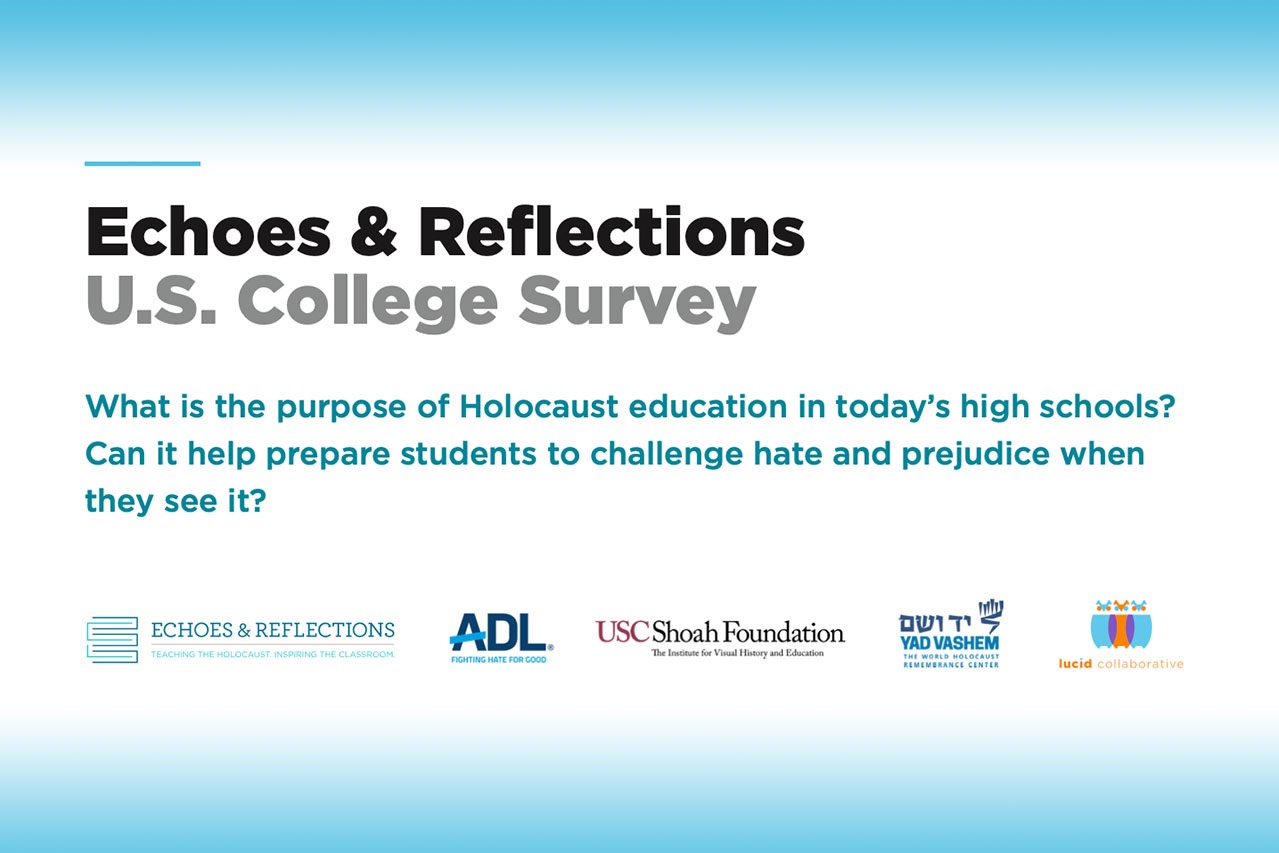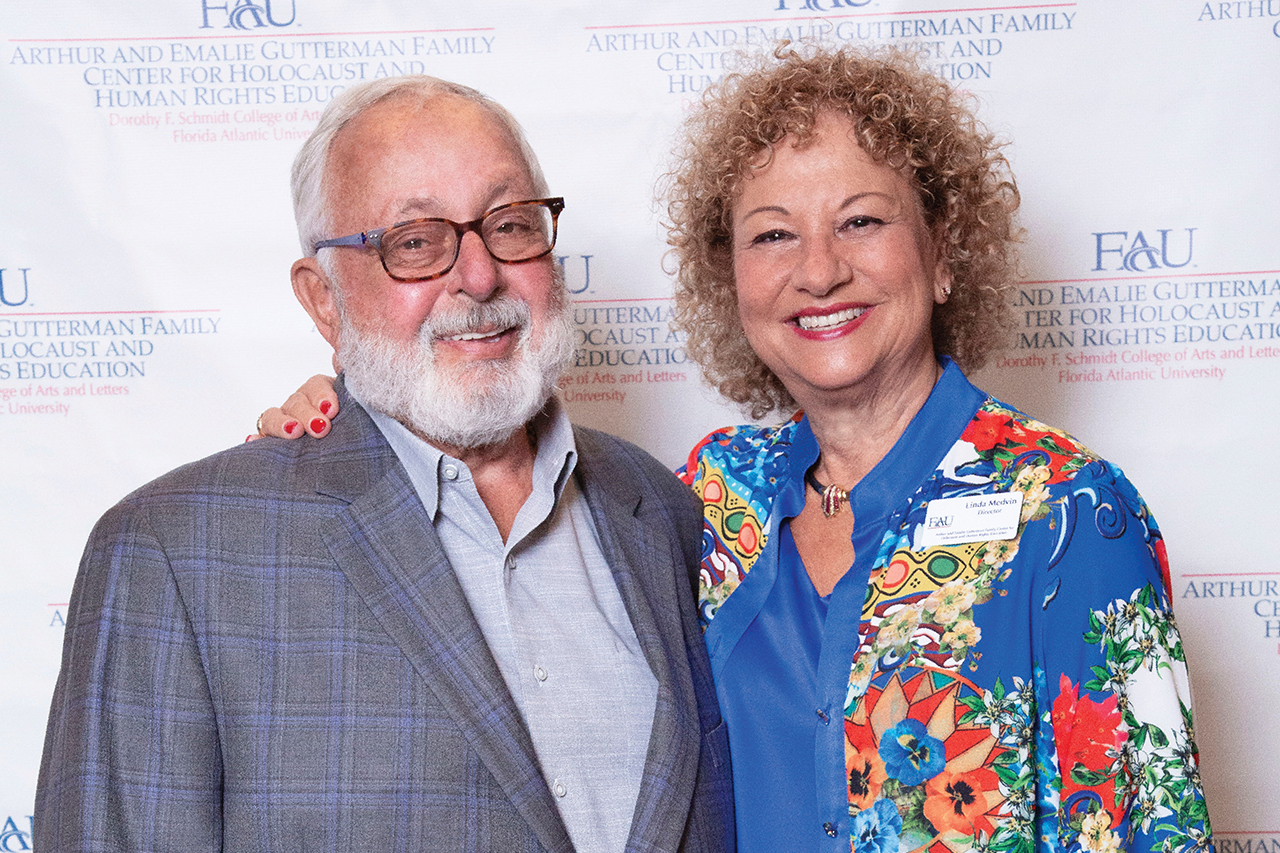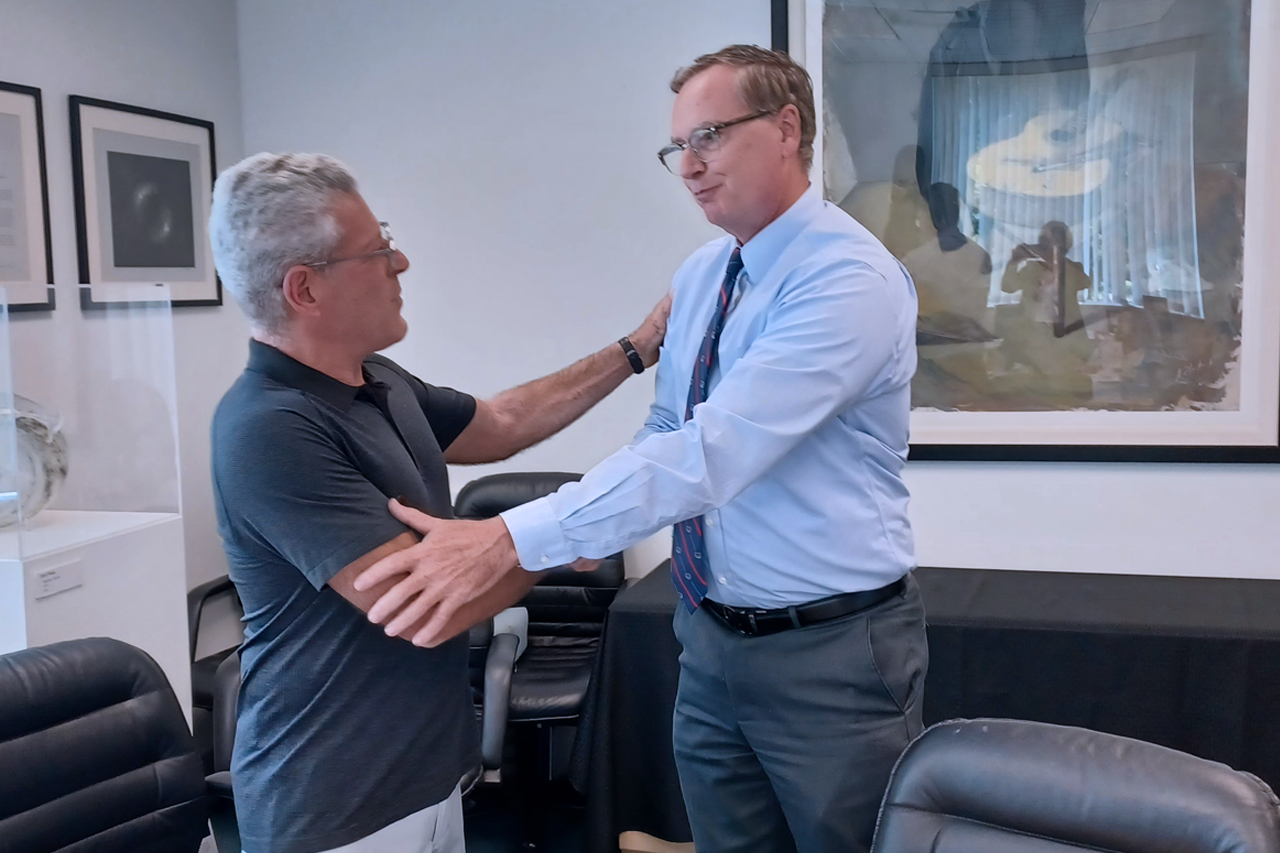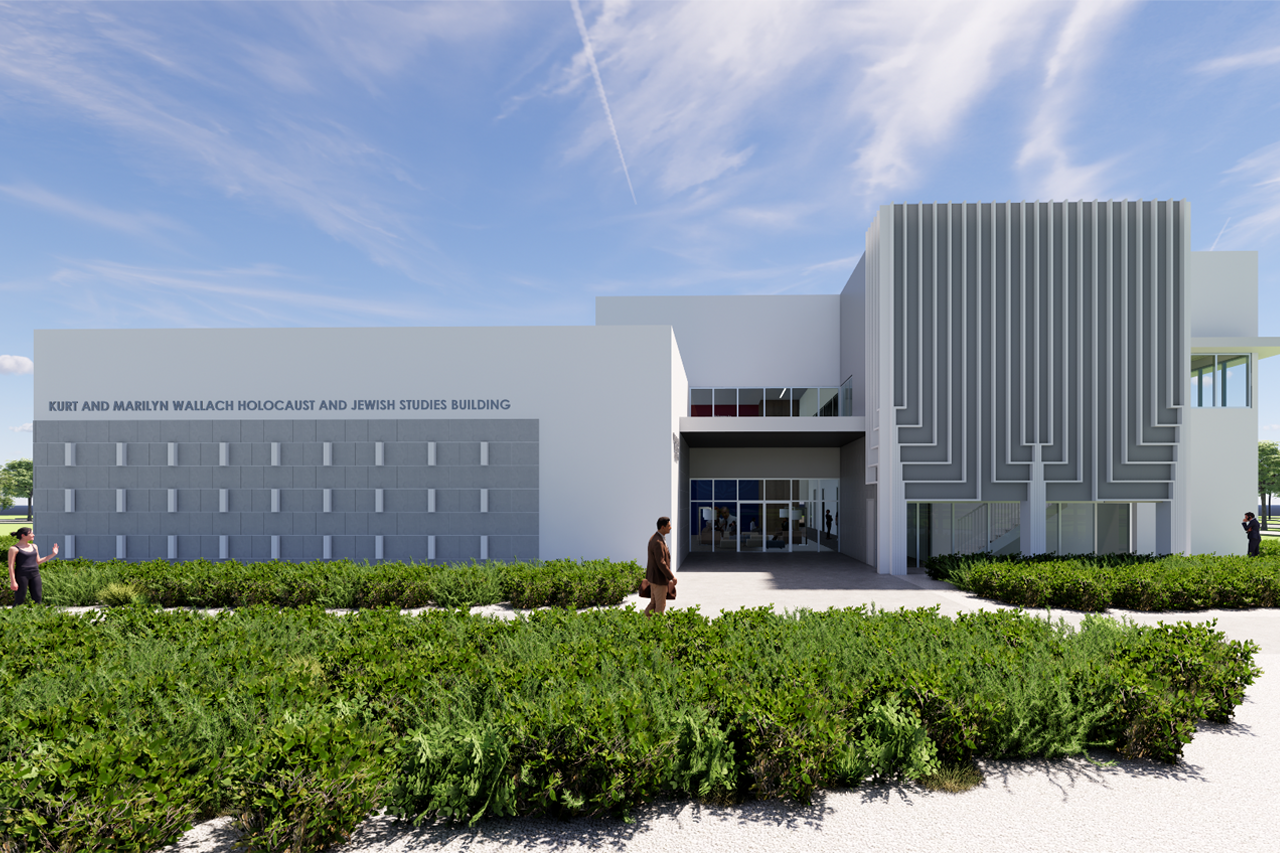Survey of U.S. College Students Shows Holocaust Education is Effective
Friday, Sep 11, 2020
The study sponsored and supported by Florida Department o Education Commissioner’s Task Force on Holocaust Education, under the leadership of Linda Medvin, Chair, and published in 2017 in the Journal of Moral Education: Holocaust knowledge and Holocaust Education experiences predict citizenship values among US adults was used as a reference for this survey. Members of the Task Force took part in some of the initial research at the Annual Meeting. It is an honor to be recognized by Echoes & Reflections, USC Shoah Foundation and Yad Vashem.
Survey of U.S. College Students Shows Holocaust Education is Effective in Building Empathy, Tolerance and Open Mindedness
Survivor Testimony Has Profound Impact on Students
A new national survey shows that Holocaust education in high school reflects gains not only in historical knowledge but also manifests in cultivating more empathetic, tolerant, and engaged students. The results also indicate that exposure to Holocaust survivor testimony is strongly associated with numerous positive outcomes in early adulthood including higher critical thinking skills and a greater sense of social responsibility.
The survey of 1,500 college students enrolled in four-year colleges and universities between the ages of 18 to 24 looked at differences between those who had received Holocaust education courses or curricula in high school and those who did not. The survey was administered by Lucid Collaborative LLC and YouGov and was released today by Echoes & Reflections, a partnership program of ADL (the Anti-Defamation League), USC Shoah Foundation, and Yad Vashem, which provides Holocaust educational programs and resources for middle and high school teachers.
Among the survey’s key findings:
- Eight out of 10 college students report having received at least some Holocaust education during high school. The majority received one month or less of Holocaust education. More than 55 percent reported watching either in-person or video survivor testimony.
- Students with Holocaust education reported greater knowledge about the Holocaust than their peers who did not receive Holocaust education; 78 percent of students with Holocaust education reported “knowing a lot or a moderate amount about the Holocaust” compared to 58 percent of students with no Holocaust education.
- Students with Holocaust education have more pluralistic attitudes and are more open to differing viewpoints, which includes being more comfortable with people of a different race or sexual orientation more generally. They are also significantly more likely to report willingness to challenge incorrect or biased information (28% more likely), challenge intolerant behavior in others (12% more likely), and stand up to negative stereotyping (20% more likely).
- When presented with a bullying scenario, students with Holocaust education reported being more likely to offer help and were 50 percent less likely to do nothing.
- Students exposed to Holocaust education demonstrate higher critical thinking skills and a greater sense of social responsibility and civic efficacy if survivor testimony was part of their experience.
“This survey only confirms what we have heard anecdotally from teachers and parents for years—that Holocaust education is effective not just as an important history lesson, but also in equipping students with the tools to identify bias and confront it when necessary,” said Jonathan Greenblatt, ADL CEO. Entrepreneur and philanthropist Yossie Hollander, who founded Echoes & Reflections with the three organizations in 2005, agrees. “Now more than ever, this survey proves that incorporating Holocaust education into every school’s curriculum is a critical component of preparing our future generation to stand up to hate and prevent history from repeating itself.”
Students also indicated that their Holocaust education (with survivor testimony and without) had helped them: make connections between the Holocaust and modern day events (48% for those exposed to survivor testimony compared to 31% for those who had no testimony); understand the importance of speaking up against any stereotyping (65% for those who had exposure, compared to 45% who did not); and understand how the Holocaust happened (71% who had exposure, compared to 50% for those who had no exposure).
“The study provides strong evidence of the positive impact of Holocaust education on student attitudes regarding diversity and tolerance in the face of hate. These attributes are sustained over time as students transition into young adulthood. It is also promising to see that the effects of Holocaust education are amplified by the use of survivor testimony in the classroom.”
- Claudia Ramirez Wiedeman, PhD, USC Shoah Foundation Director of Education and Evaluation.
For more information about the Echoes & Reflections College Survey Results visit echoesandreflections.org.
About the Study
Echoes & Reflections commissioned Lucid Collaborative LLC, with oversight by evaluation experts from USC Shoah Foundation at the University of Southern California, to administer a survey of U.S. college students to explore the relationship between exposure to Holocaust education in high school and subsequent student attitudes, beliefs, and behaviors on US college campuses. Working with the national polling company YouGov, Echoes & Reflections U.S. College Survey gathered a representative sample of data from 1,500 post-secondary students, aged 18-24, enrolled in four-year colleges and universities in the United States. The survey’s margin of error was plus or minus 3%.
About Echoes & Reflections
Echoes & Reflections is the premier source for Holocaust educational materials and dynamic content, empowering teachers and students with the insight needed to question the past and foresight to impact the future. A joint program of ADL, USC Shoah Foundation, and Yad Vashem, Echoes & Reflections is dedicated to reshaping the way that teachers and students understand, process, and navigate the world through the events of the Holocaust. Since 2005, Echoes & Reflections has impacted more than 72,000 educators, reaching an estimated seven million students across the United States. Through their programs and resources, educators gain the skills, knowledge, and confidence to teach this topic effectively. Learn more at echoesandreflections.org .
About ADL
ADL is a leading anti-hate organization. Founded in 1913 in response to an escalating climate of antisemitism and bigotry, its timeless mission is to protect the Jewish people and to secure justice and fair treatment for all. Today, ADL continues to fight all forms of hate with the same vigor and passion. ADL is the first call when acts of antisemitism occur. A global leader in exposing extremism, delivering anti-bias education and fighting hate online, ADL’s ultimate goal is a world in which no group or individual suffers from bias, discrimination or hate. More at www.adl.org.
About USC Shoah Foundation
USC Shoah Foundation – The Institute for Visual History and Education develops empathy, understanding and respect through testimony, using its Visual History Archive of more than 55,000 video testimonies, award-winning IWitness education program, and the Center for Advanced Genocide Research. USC Shoah Foundation's interactive programming, research and materials are accessed in museums and universities, cited by government leaders and NGOs, and taught in classrooms around the world. Now in its third decade, USC Shoah Foundation reaches millions of people on six continents from its home at the Dornsife College of Letters, Arts and Sciences at the University of Southern California.
About Yad Vashem
Yad Vashem, the World Holocaust Remembrance Center, is the ultimate source for Holocaust education, documentation, commemoration and research. From the Mount of Remembrance in Jerusalem, Yad Vashem's integrated approach incorporates meaningful educational initiatives, groundbreaking research and inspirational exhibits. Its use of innovative technological platforms maximizes accessibility to the vast information in the Yad Vashem archival collections for an expanding global audience. Yad Vashem is at the forefront of unceasing efforts to safeguard and impart the memory of the victims and the events of the Shoah period; to document accurately one of the darkest chapters in the history of humanity; and to grapple effectively with the ongoing challenges of keeping the memory of the Holocaust relevant today and for future generations.


